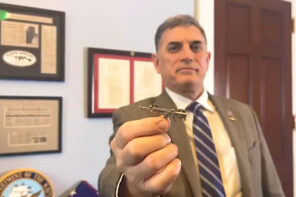A vicious lack of civility is nothing new in American politics. To rely only on recent memory, conservatives have attempted to frame Obama as a foreign-born Manchurian candidate bent on turning the United States into a communist dictatorship built around his own cult of personality. The scale, media coordination and sheer, unsubstantiated nastiness of Right-wing smears is in its own league, but conservatives have pointed out that the Left is not exactly a realm of pure civil, reasoned discussion either. In any case, recent conduct at town hall meetings suggests that American politics has moved from bar-room brawl to back-alley knife fight.
So why the outrage at Rep. Joe Wilson, who’s heckling call of “You Lie!” must surely rank among the mildest expressions of discontent in recent years, at least in its pure linguistic content? Why did both Democratic and Republican legislators, including John McCain, so quickly and resolutely condemn the outburst, forcing Wilson into an almost immediate apology?
Certainly, the far right wants to know. Rush Limbaugh has backed Wilson, and “I’m with Joe Wilson” t-shirts are apparently in the offing. A quick glance around the far-right blogosphere and their comments sections finds consistent themes: Democrats have booed Republican presidents (of course, it is individualized heckling at issue here), ergo the outrage is manufactured; Wilson was merely calling out what any conservative would recognize as a lie in a speech full of them; Wilson was giving voice to their opinions, and he should keep doing so. Of course, moderate conservative blogs have also criticized Wilson for incivility.
Yet more is at stake. While much of the commentary has focused on issues of respect and civility, something much deeper—something religious—is at issue. For several decades, scholars have debated the notion of civil religion—a “national religious self-understanding” (in sociologist Robert Bellah’s terms) that imbues the nation itself with a religious dimension. The argument has drawn attacks on many levels, but in broad ways it still rings true.
A few examples may help: the lift you get when you hear “The Star Spangled Banner” at the Olympics; the reverence that surrounds Constitution and the Declaration of Independence; the awe that descends at the Lincoln Memorial—these are religious feelings. When Americans feel these things, when they feel lifted by the glow of the sacred that surrounds the symbols and rites of the nation, they feel bound to something bigger than themselves and bound together despite their differences. Or so the argument goes, more or less.
In a nation that seems bereft of any unity, and that has a nationalist and militaristic streak, the notion of a meaningful civil religion carries a whiff of the ridiculous or the dangerously naive. Yet prophetic reformers from Martin Luther King, Jr. to Frederick Douglass have relied on it when they called on the nation to pay more than lip service to our highest ideals. In fact, it was his voicing of these sentiments at the 2004 Democratic National Convention that launched Barack Obama onto the national political stage. Responding to “spin masters” and “negative ad peddlers,” he said:
…there is not a liberal America and a conservative America—there is the United States of America. There is not a Black America and a White America and Latino America and Asian America—there’s the United States of America.
After all, even a commitment to argue with each other carries implicit commitment to the nation and its democratic institutions.
Civil religion—and the power of civil religious ritual—goes a long way towards explaining the outrage felt by legislators and by many Americans. The president was not speaking to a labor union in Ohio or to teachers in Florida—he was speaking to a joint session of Congress, a ritualized setting that invokes all the sacredness of the democratic government of the United States of America. Americans tend to watch such speeches together—as families, in restaurants, in bars. For a few moments, a significant portion of the nation is gathered, if only via television, into a ritual moment.
These are sacred times in the country’s most sacred space, presided over by the supreme figurehead of the nation. In the streets, we may protest. On TV, we can scream. On the Internet, we can abandon all pretense of civil discourse. But at a joint session of Congress, we know we are supposed to listen, if only for a moment. Yes, collective booing has long been a ritually acceptable form of dissent at joint sessions of Congress. But individualized heckling, not so much. The rules of ritual don’t need logical consistency to be powerful or sacred; they need only to be generally recognized as how things must be done.
To break the rules in such a moment does not simply signify bad manners—Americans are used to that. Instead, it jars us viscerally because, however unconsciously, it seems like a profanation. Nancy Pelosi wasn’t calculating that look of horror and contempt, I supect; she felt it. To use a very inexact analogy, imagine a person screaming “You Lie!” during a papal mass. Even a Catholic who seriously disagreed with Benedict XVI’s theology would feel a jolt of horror, because they feel an internal bond to the institution and its rituals.
Did Joe Wilson intend any of this? I seriously doubt it. My point is this: disregard for ritual etiquette is not as inconsequential as it may seem. It reflects and deepens strains on the moral forces, the civil religious forces, that bind Americans together even in their disagreement. That these forces are already stretched thin is doubtless—the recent images of town hall meetings do not suggest a people committed to working out their differences in civil exchange and rational debate.




